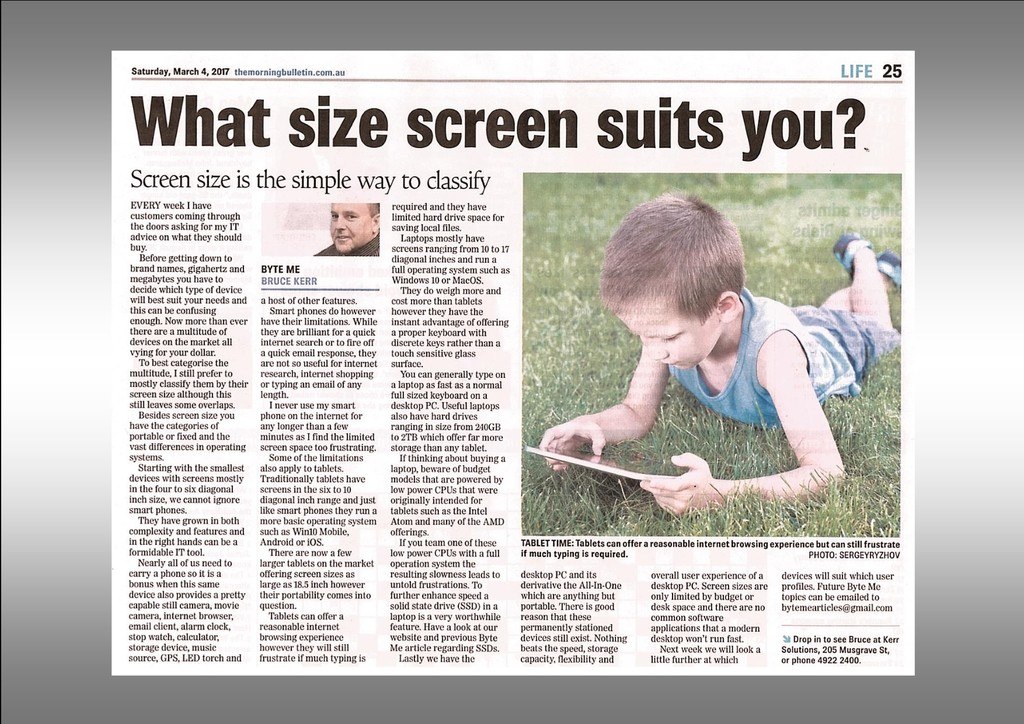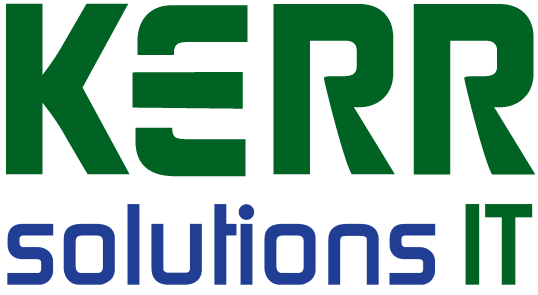25th February 2017
What Screen Size Suits You
Every week I have customers coming through the doors asking for my IT advice on what they should buy. Before getting down to brand names, gigahertz and megabytes you have to decide which type of device will best suit your needs and this can be confusing enough. Now more than ever there are a multitude of devices on the market all vying for your dollar.
To best categorise the multitude of IT devices currently on the market, I still prefer to mostly classify them by their screen size although this still leaves some overlaps that need addressing. Besides screen size you have the categories of portable or fixed and the vast differences in operating systems.
Starting with the smallest devices with screens mostly in the 4 to 6 diagonal inch size, we cannot ignore smart phones. They have grown in both complexity and features and in the right hands J can be a very formidable IT tool. Nearly all of us need to carry a phone so it is a bonus when this same device also provides a pretty capable still camera, movie camera, Internet browser, Email client, alarm clock, stop watch, calculator, storage device, music source, GPS, LED torch & a host of other features.

Smart phones do however have their limitations. Whilst they are brilliant for a quick Internet search or to fire off a quick email response, they are not so useful for Internet research, Internet shopping or typing an email of any length. I never use my smart phone on the Internet for any longer than a few minutes as I find the limited screen space too frustrating.
Some of the limitations surrounding smart phones also apply to tablets. Traditionally tablets have screens in the 6 to 10 diagonal inch range and just like smart phones they run a more basic operating system such as Win10 Mobile, Android or iOS. There are now a few larger tablets on the market offering screen sizes as large as 18.5 inch however their portability comes into question. Tablets can offer a reasonable Internet browsing experience however they will still frustrate if much typing is required and they have limited hard drive space for saving local files.
Laptops mostly have screens ranging from 10 to 17 diagonal inches and run a full operating system such as Windows 10 or MacOS. They do weigh more and cost more than tablets however they have the instant advantage of offering a ‘proper’ keyboard with discrete keys rather than a touch sensitive glass surface. You can generally type on a laptop just as fast as a normal full sized keyboard on a desktop PC. Useful laptops also have hard drives ranging in size from 240GB to 2TB which offer far more storage than any tablet.
If thinking about the purchase of a laptop beware of budget models that are powered by low power CPU’s that were originally intended for tablets such as the Intel Atom and many of the AMD offerings. If you team one of these low power CPU’s with a full operation system the resulting slowness leads to untold frustrations. To further enhance speed a solid state drive (SSD) in a laptop is a very worthwhile feature. Simply have a look at our website and previous Byte Me article regarding SSD’s.
Lastly we have the desktop PC and its derivative the All-In-One which are anything but portable. However there is good reason that these permanently stationed devices still exist. There is nothing that beats the speed, storage capacity, flexibility and overall user experience of a desktop PC. Screen sizes are only limited by budget or desk space and there are no common software applications that a modern desktop won’t run fast.
Next week we will look a little further at which devices will suit which user profiles.
Future Byte Me topics can be emailed to [email protected] and Bruce is contactable at Kerr Solutions, 205 Musgrave Street or on 49 222 400.
For more advice and assistance from Kerr Solutions, like and follow us on Facebook
